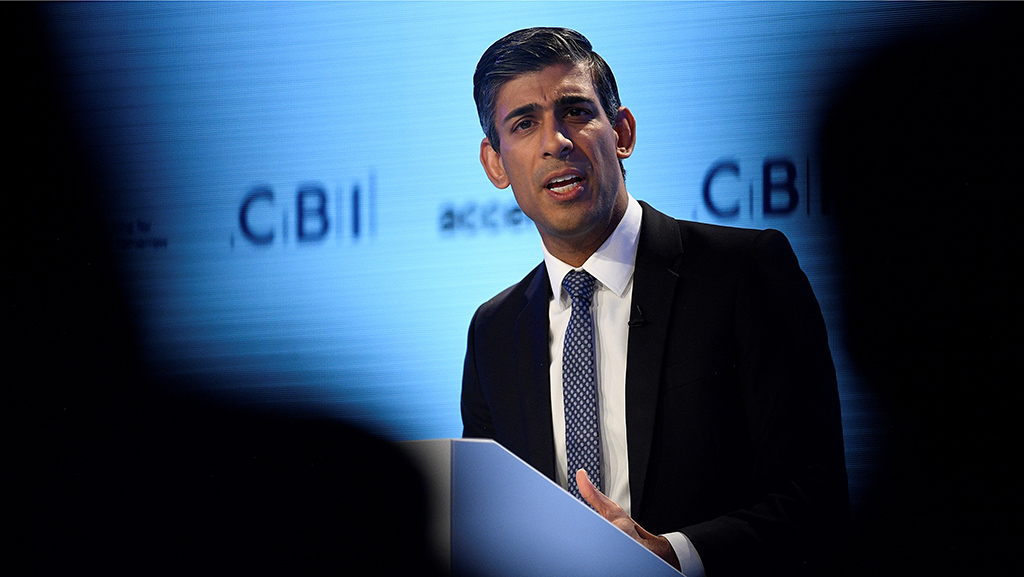LONDON: Britain needs more migrant labor to boost productivity as it faces a toxic mix of soaring inflation and shrinking growth, the country's main business lobby group warned Monday. The verdict from the Confederation of British Industry came at its annual gathering in Birmingham, Britain's second biggest city. The CBI conference comes after the government of Prime Minister Rishi Sunak slashed spending and hiked taxes in a budget, despite admitting that the inflation-wracked economy had fallen into recession. "We come together, once more in extraordinary times," CBI director-general Tony Danker told delegates in Birmingham, central England.
"Britain is in the middle of stagflation-rocketing inflation and negative growth-for the first time that probably most of us can remember. "We know how to fight inflation. We know how to fight recession. But we don't really know how to fight them together." Sunak, who also addressed the CBI on Monday, took office one month ago after predecessor Liz Truss delivered an unfunded tax-slashing mini-budget that tanked the pound and sent UK borrowing costs soaring. UK inflation sits at a 41-year peak of 11.1 percent on rocketing food and energy costs in the wake of the Ukraine war.
Consumer prices have also raced higher as demand rebounds following the lifting of pandemic lockdowns. That has worsened a cost-of-living crisis for businesses and individuals, hit also by soaring interest rates as the Bank of England seeks to cool runaway inflation. The UK has forecast the economy to shrink 1.4 percent next year, hit also by fallout from Brexit which has resulted in foreign workers returning home.
"When you look at the (growth) data, the only thing holding it up, actually, is higher hours worked due to higher immigration," Danker added on Monday. "People are arguing against immigration-but it's the only thing that has increased our growth potential since March. "Let's be honest-we don't have the people we need, nor do we have the productivity."
Focus on illegal immigration
Sunak, addressing the conference later on Monday, ducked the CBI's call for more legal migrant labor-and stressed that he was focused on curbing illegal migration. "The country's number one priority right now, when it comes to migration, is tackling illegal migration," he said. "When people see that happening, it undermines trust in the system, it doesn't seem fair that people are able to break the rules.
"That's what I'm absolutely determined to fix." He also told CBI delegates that last week's budget sought "to grip inflation and balance the books". "The best way to help people is by stopping mortgages, rents and food prices from spiraling out of control," Sunak said. "Re-establishing stability is the critical first step. But there is so much more we need to do," he added, stressing he wants to see more business innovation to boost economic activity.
He touted greater curbs on immigration-a key plank of the Brexit deal-and closer trade ties with Asia. But he added: "Let me be unequivocal about this: under my leadership, the United Kingdom will not pursue any relationship with Europe that relies on alignment with EU laws." The UK left the EU in full in January 2021, after years of political wrangling since the divisive referendum n 2016 to split from the bloc.
Brexit saw the UK withdraw from the European single market and customs union, while free movement between member states and the jurisdiction of European courts ended. But a deal between London and Brussels maintained largely tariff-free trade with its remaining 27 members. Sunak's comments follow a Sunday Times report that "senior government figures" were planning to "put Britain on the path towards a Swiss-style relationship" with the EU. Switzerland has far closer ties with the bloc through bilateral agreements allowing access to the single market, a high degree of free movement and by paying into EU coffers.
The report, and comments last week by finance minister Jeremy Hunt, who voted to remain in the EU, that he was eager to remove the "vast majority" of trade barriers with the EU. That has sparked unease among eurosceptic members of the ruling Conservative party. "The government has got to focus on what it needs to do, rather than trying to reopen a settled debate about Europe," former Tory leader Iain Duncan Smith told The Sun.
Bad deals?
The backlash stirred memories of the febrile aftermath of the referendum about how best to deliver Brexit. Former prime minister Boris Johnson, a staunch critic of his predecessor Theresa May's plan for Swiss-style ties, eventually won the argument with his harder version of Brexit. He won a landslide election victory in December 2019 on a vow to "get Brexit done", having negotiated his own 2019 divorce deal. However, three years on, the UK is in a deep economic crisis and criticism of both Johnson's agreement and the whole Brexit project is increasing. Amid decades-high inflation and forecasts of its longest ever recession, a new YouGov poll last week suggested 56 percent of people now think it was wrong to leave the EU.
Some 32 percent were still in favor. The Office for Budget Responsibility watchdog assessed that Brexit had had a "significant adverse impact" on UK trade, in comments backed by the Bank of England. The OBR blamed Brexit for reducing overall trade volumes and denting trading relationships with the bloc. The gloomy economic news was compounded by London losing its prized status as the biggest European stock market to Paris. Brexiteers promised to strike trade deals around the world, including with the potentially lucrative United States market. - AFP











